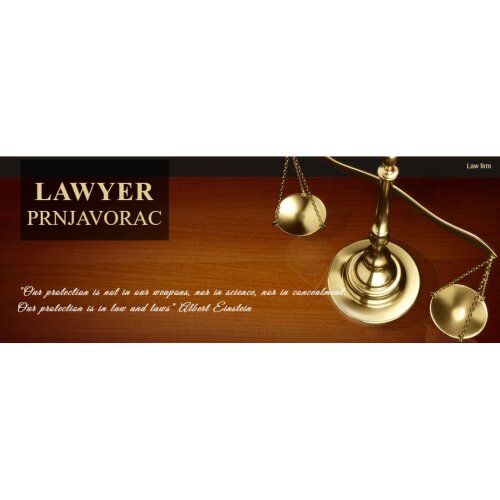
Best Land Use & Zoning Lawyers in Tuzla
Share your needs with us, get contacted by law firms.
Free. Takes 2 min.
List of the best lawyers in Tuzla, Bosnia and Herzegovina

About Land Use & Zoning Law in Tuzla, Bosnia and Herzegovina
Land use and zoning laws in Tuzla, Bosnia and Herzegovina, are designed to regulate the development and utilization of land within the city and its adjoining areas. These laws help organize urban growth, protect natural resources, and ensure that the economic and social needs of the community are met efficiently. As Bosnia and Herzegovina is a country with a complex administrative structure, land use laws may vary across different entities, but they typically involve planning regulations, building codes, and zoning ordinances. The local government in Tuzla plays a critical role in approving zoning plans, issuing building permits, and ensuring compliance with regional and national regulations.
Why You May Need a Lawyer
Legal expertise might be necessary for several reasons, such as disputes over property boundaries, changes in zoning regulations that affect your property or development plans, and complex permit processes. Other situations where a lawyer's assistance might be needed include obtaining relief from zoning restrictions or navigating through governmental bureaucracy to secure development approvals. Engaging a legal expert can ensure compliance with local laws and help protect your interests in land use and zoning matters.
Local Laws Overview
Key aspects of Tuzla's land use and zoning laws include the Tuzla Urban Planning Strategy, which provides frameworks for residential, commercial, industrial, and recreational zones. The zoning ordinances dictate what types of structures can be built in specific areas and what activities are permissible. Building codes set standards for the construction and safety of buildings, and local environmental laws ensure that developments do not harm the natural surroundings. There is also a focus on heritage preservation in the city, which means that certain structures or areas may have additional restrictions.
Frequently Asked Questions
What is zoning?
Zoning refers to the laws and regulations that define how land in specific geographic zones can be used. These laws determine whether a lot can be used for residential, commercial, industrial, or other purposes.
How can I find out the zoning designation of a property in Tuzla?
The zoning designation for a property can typically be obtained from the local municipal office or through their official website where zoning maps are often made available to the public.
Can zoning laws change, and if so, how does it affect property owners?
Yes, zoning laws can change, often due to new urban planning strategies or development trends. This could impact property owners by altering what activities are permissible on their land or affecting property values.
What is a variance, and when might I need one?
A variance is a legal exception to the zoning regulations, allowing the property owner to use the land in a way that is not typically permitted under the current zoning laws. Variances are often needed when a property owner wishes to develop land in a manner that deviates from local zoning restrictions.
What are the steps to appeal a zoning decision?
To appeal a zoning decision, you typically need to file an appeal with the relevant municipal body within a set period. This involves presenting arguments or evidence justifying why the zoning decision should be reconsidered. Legal assistance can facilitate this process.
Are there restrictions for commercial use of residential properties in Tuzla?
Yes, in most cases, residential zones have restrictions that prevent commercial activities to maintain the residential character of these areas. Some home-based businesses might be permitted under certain conditions.
What are the consequences of violating zoning laws?
Consequences can include fines, a requirement to revert illegal developments, and in extreme cases, legal action resulting in more significant penalties. Adhering to regulations from the start can avoid these issues.
Is there a process for the community to have a say in zoning decisions?
Yes, public hearings and consultations are often part of the decision-making process for significant zoning changes, allowing community members to express their concerns or support for proposed changes.
What impact do heritage preservation considerations have on land use decisions?
Heritage preservation can impose additional restrictions on land use to protect historical and cultural sites. This might limit modifications or development in affected areas to comply with preservation standards.
How do environmental regulations affect land use in Tuzla?
Environmental regulations ensure that land use and development do not harm the ecosystem. This might include restrictions on developments near protected natural areas, requirements for environmental impact assessments, and ensuring sustainable practices are followed.
Additional Resources
Key resources include the Tuzla City Government's urban planning department, the Ministry of Spatial Planning of Tuzla Canton, and local legal firms specialized in land use and zoning law. Community organizations and non-profits focused on urban development may also offer guidance.
Next Steps
If you require legal assistance in land use and zoning, consider consulting with a lawyer specializing in this field. Start by reviewing your situation to identify specific legal needs, then search for local attorneys with relevant experience. Preparing documentation and questions beforehand can make consultations more effective. Engaging with local governmental bodies early in the planning process can also provide clarity and help navigate complex regulations.
The information provided on this page is intended for informational purposes only and should not be construed as legal advice. While we strive to present accurate and up-to-date information, we cannot guarantee the accuracy, completeness, or currentness of the content. Laws and regulations can change frequently, and interpretations of the law can vary. Therefore, you should consult with qualified legal professionals for specific advice tailored to your situation. We disclaim all liability for actions you take or fail to take based on any content on this page. If you find any information to be incorrect or outdated, please contact us, and we will make efforts to rectify it.









